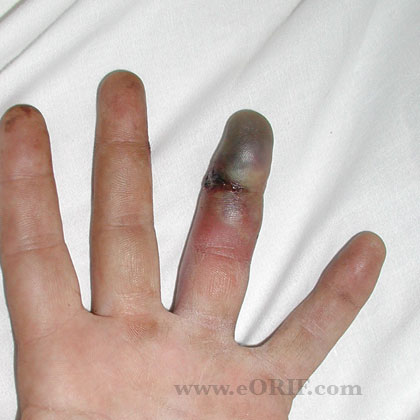 |
Human Bite Cat Bite Dog Bite
Human Bite
- ICD-9 = E928.3
- Fite Bite = small lacerations over the MCP joints caused by punching opponents face/teeth. Any laceration over the MCPs associated with a metacarpal neck or shaft fracture must be assumed to be contaminated with human oral flora and irrigated and debrided unless proven otherwise.
- Most commonly pathogens: Alpha-hemolytic Streptococcus and S aureus. Also consider Eikenella corrodens and anaerobes.
- Prophylactic treatment: Amoxicillin/clavulanate 875/125 mg po BID x7 days.
- Treatment: patients with any signs of infection should be admitted and treated with IV antibiotics. Any fluctuant or questionable areas should be treated with irrigation and debridement. Ampicillin/Sulbactam 1.5g IV q6hr or cefoxitin 2 g IV 18hr of ticarcillin/clavulanate 3.1g IV q6hr or piperacillin/tazobactam 3.375g IV q6hr. PCN allergy: clindamycin 300mg PO QID and ciprofloxacin 250-500mg PO q12hr or trimethaprim/sulfamethoxazole (Bacrtim DS PO q12hr)
Dog Bite
- ICD-9 = E906.0
- Most commonly pathogens: V. Streptococcus, Pasteurella multocida and S aureus. Also consider Eikenella corrodens, bacteroides and anaerobes. Always consider Rabies.
- Prophylactic treatment: Amoxicillin/clavulanate 875/125 mg po BID x7 days.
- Treatment: patients with any signs of infection should be admitted and treated with IV antibiotics. Any fluctuant or questionable areas should be treated with irrigation and debridement. Ampicillin/Sulbactam 1.5g IV q6hr or cefoxitin 2 g IV 18hr of ticarcillin/clavulanate 3.1g IV q6hr or piperacillin/tazobactam 3.375g IV q6hr. PCN allergy: clindamycin 300mg PO QID or trimethaprim/sulfamethoxazole
Cat Bite
- ICD-9 = E906.3
- Most commonly pathogens: Pasteurella multocida and S aureus.
- Prophylactic treatment: Amoxicillin/clavulanate 875/125 mg po BID x7 days.
- Treatment: patients with any signs of infection should be admitted and treated with IV antibiotics. Any fluctuant or questionable areas should be treated with irrigation and debridement. Cefuroxime 500mg PO Q12hr or doxycycline 100mg PO BID PCN allergy: clindamycin 300mg PO QID or trimethaprim/sulfamethoxazole
- Cats teeth have an increased incidence of deep penetration into joints and tendon sheaths.
References
- Abrams RA, JAAOS 1996;4:219
|